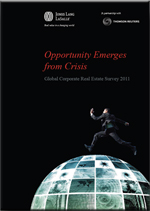
by Brianna Crandall — March 28, 2011—Companies are increasing their demand for maximum productivity and smart growth, a shift from the focus on cost control that came with 36 months of turbulence in the corporate operating environment, according to the inaugural Jones Lang LaSalle and Thomson Reuters’ Opportunity Emerges from Crisis: Global Corporate Real Estate Survey 2011. The survey drew responses from more than 500 CRE executives around the globe and across a variety of industries in an effort to identify the challenges facing the CRE industry over the next three years.
According to the report, as companies emerge from the global financial crisis they are seeking to restructure and plan for a new economic era, which is placing more pressure and scrutiny on the productive use of corporate real estate (CRE).
This presents a powerful opportunity for CRE teams to drive strategic change and bring added value to their wider businesses, says Jones Lang LaSalle. CRE teams will be required to respond with greater agility, expediency and productivity, increasing their reliance on outsourced service providers (70 percent of global companies surveyed expected to adopt hybrid delivery models by 2014) as corporations shift from short-term, survival-motivated tactics towards medium-term, strategic initiatives aimed at driving productivity enhancements.
Under the recent tight financial conditions, 97 percent of survey respondents supported their business with one or more tactical real estate plays to reduce cost. With improving corporate health, firms are turning to growth strategies that balance growth and cost control. The most influential factor in shaping real estate strategy in the next three years is expected to be growth (35 percent), followed by cost pressures (11 percent).
Among the top influences on future real estate strategies, 77 percent of survey respondents identified the need to attract talent, the quest for enhanced productivity, right-sizing the portfolio for a new organizational reality, or a desire to change the culture and nature of work. Creating more efficient workspace that is conducive to modern work styles and receptive to the demands of knowledge workers will assist CRE leaders in meeting these demands and building additional value for their businesses.
The survey reveals that respondents are seeing a return to growth in select geographies. Thirty-nine percent of respondents anticipate an increase in the total size of their global real estate portfolio over the next three years, while 31 percent predict a reduction. Net growth is strongest in the Asia-Pacific region and in particular North Asia (60 percent), South Asia (primarily India) (43 percent), and South East Asia (37 percent).
Respondents suggest that in the United States and Western Europe overall portfolio size will reduce over the next three years as consolidation continues to drive utilization rate improvements.
Among the most active industry sectors, the finance sector is forecast to grow most notably in North Asia, with 63 percent of respondents predicting portfolio growth. The technology sector is also predicting portfolio growth in North Asia (67 percent), Latin America (44 percent) and Southeast Asia (44 percent).




